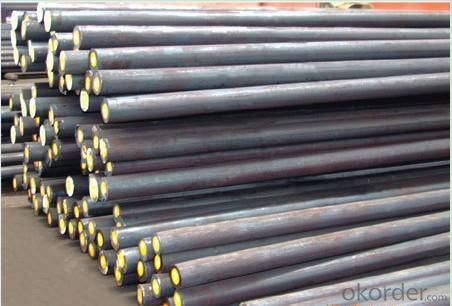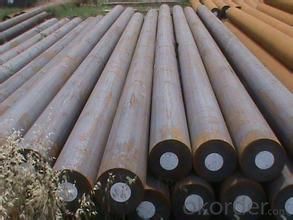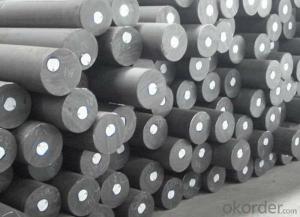Grade AISI 1060 CNBM Carbon Steel Round Bars C60
- Loading Port:
- Shanghai
- Payment Terms:
- TT OR LC
- Min Order Qty:
- 3 m.t.
- Supply Capability:
- 10000 m.t./month
OKorder Service Pledge
OKorder Financial Service
You Might Also Like
Item specifice
Specifications:
1.Diameter: 10mm - 1200mm
2.Length: Max 12m
4.Tech:EAF,LF,VD,ESR
5. Technique: Hot rolled
Description | Carbon Steel Rod/Carbon Steel Bar,carbon steel rod,carbon steel shaft,mild steel bar, Mild steel shaft,ms bar | |
Material | ASTM | 1005,1006,1008,1010,1015,1020,1025,1030,1035, |
DIN | Ck10,Ck15,Ck22,Ck25,Ck30,Ck35,Ck40,Ck45,Ck50, 30Mn4,40Mn4 | |
BS | 040A04,095M15,045M10,080A40,045M10,080M50 | |
Standard | GB/T799,ASTM A29,A108,A321,A575,BS970,DIN1652,JIS G4051 | |
Section shape | Round,square,hexagonal,flat,angle | |
Surface | Black painted,galvanized | |
Specifications | Round bar | Diameter: 10mm~1200mm |
Angle bar | Size: 3mm*20mm*20mm~12mm*800mm*800mm | |
Square bar | Size: 4mm*4mm~100mm*100mm | |
Flat bar | Thickness: 2mm~100mm | |
Width:10mm~500mm | ||
Hexagonal | Size: 4mm~800mm | |
Length | 2m,4m,5.8m,6m,11.8m,12m or as required. | |
Chemical Composition:
C | Si | Mn | P | S | Cr | Ni | Cu |
0.47~0.55 | 0.17~0.37 | 0.50~0.80 | ≤0.035 | ≤0.035 | ≤0.15 | ≤0.25 | ≤0.25 |
Usage and Applications:
Mold bottom
Plastic mold
Construction machinery parts
Automobile parts
Security grills
Screens
Construction
Packaging & Delivery:
Packaging Detail: Standard seaworthy packing or as customer required; all goods are packed in bundle with steel strips and shipped by break bulk vessel or container
Delivery Detail: 45 days
Production Flow:
EAF+LF+VD+ Forged+ Heat Treatment
Material prepare (billet) — heat up — rough rolling — precision rolling — cooling — packing — storage and transportation


Quality Assurance:
1. We will strictly inspect our production that we sold according to the customer’s request.
2. Our steel reaches international quality standards.
3. Quality should be in conformity with the specification of the manufacturer. Quantity and packing conditions should be in conformity with the term in the contract.
4. Should the packing found damaged, the buyer has the right to claim to the seller
- Q:How does special steel perform in power generation applications?
- Special steel is highly valued in power generation applications due to its exceptional properties and performance. Power generation equipment such as gas turbines, steam turbines, and nuclear reactors operate under extreme conditions of high temperature, pressure, and corrosive environments. Special steel alloys, specifically designed to withstand these harsh conditions, offer several advantages in power generation applications. Firstly, special steel exhibits excellent heat resistance, making it ideal for power generation equipment that operates at high temperatures. This steel has a high melting point, enabling it to maintain its structural integrity and mechanical properties even at elevated temperatures. This is crucial for gas turbines and steam turbines, which generate power by converting thermal energy into mechanical energy. Secondly, special steel possesses superior strength and toughness, making it well-suited for power generation applications that require reliable and durable components. Power plants operate continuously, often for long periods, and are subject to significant mechanical stresses. Special steel can withstand these loads without deformation or failure, ensuring the safe and efficient operation of power generation equipment. Furthermore, special steel exhibits excellent resistance to corrosion and oxidation, which are prevalent in power generation environments. This steel is designed to resist the corrosive effects of high-temperature gases, steam, and water, ensuring the longevity of power generation equipment. Corrosion-resistant alloys of special steel are commonly used in power plants to prevent material degradation and maintain operational efficiency. In addition to its mechanical and corrosion-resistant properties, special steel also offers excellent weldability and machinability. This makes it easier to fabricate and assemble power generation equipment, reducing production time and costs. Overall, special steel is a reliable and high-performance material for power generation applications. Its exceptional heat resistance, strength, toughness, corrosion resistance, and weldability make it an ideal choice for gas turbines, steam turbines, and other power generation equipment. The use of special steel in power generation contributes to increased efficiency, reliability, and longevity of these critical systems.
- Q:What are the different forms in which special steel is available?
- Special steel is available in various forms such as bars, sheets, plates, coils, tubes, pipes, and wires.
- Q:How is special steel used in the production of injection molds?
- Special steel is commonly used in the production of injection molds due to its high strength, durability, and resistance to wear and corrosion. These properties make it ideal for withstanding the high temperatures, pressures, and repetitive stresses involved in the injection molding process. Additionally, special steel's excellent heat conduction enables efficient cooling, resulting in faster production cycles and improved part quality. Overall, the use of special steel in injection molds ensures the production of high-quality, precise, and consistent plastic parts.
- Q:What are the different surface treatment techniques for special steel?
- There are several different surface treatment techniques for special steel, including: 1. Electroplating: This technique involves the deposition of a thin layer of metal onto the surface of the steel through an electrochemical process. It helps enhance corrosion resistance, improve appearance, and provide a protective coating. 2. Nitriding: Nitriding involves the diffusion of nitrogen into the surface of the steel, resulting in a hardened and wear-resistant layer. This technique improves the material's strength, toughness, and resistance to fatigue. 3. Carburizing: Carburizing is a heat treatment process that introduces carbon into the steel surface, creating a hard and wear-resistant layer. It enhances the material's strength, hardness, and resistance to wear. 4. Coating: Various coating techniques, such as thermal spraying, chemical vapor deposition, and physical vapor deposition, can be employed to apply a protective layer onto the steel surface. These coatings can offer improved corrosion resistance, wear resistance, and thermal stability. 5. Shot peening: Shot peening involves bombarding the steel surface with small metal or ceramic particles, which induce compressive stresses and improve fatigue resistance. It also helps to reduce stress corrosion cracking and enhance the material's mechanical properties. These surface treatment techniques play a crucial role in improving the performance, durability, and overall quality of special steel in different industrial applications.
- Q:What are the different non-destructive evaluation techniques used for special steel?
- There are several non-destructive evaluation techniques used for special steel, including ultrasonic testing, magnetic particle inspection, liquid penetrant testing, eddy current testing, and radiographic testing. These techniques are used to detect flaws, defects, and structural integrity issues in special steel without causing any damage to the material.
- Q:What are the different methods of surface cleaning for special steel?
- There are several different methods of surface cleaning for special steel, including mechanical methods such as abrasive blasting or grinding, chemical methods like pickling or passivation, and electrochemical methods such as electrocleaning or electropolishing. Each method has its own advantages and is chosen based on the type of contamination or surface condition that needs to be addressed.
- Q:Can special steel be used in the production of surgical implants?
- Yes, special steel can be used in the production of surgical implants. Special steels such as stainless steel or titanium alloys are often chosen for their corrosion resistance, biocompatibility, and mechanical properties, making them suitable for manufacturing surgical implants that need to be durable and compatible with the human body.
- Q:How does special steel contribute to the performance of cutting tools?
- Special steel contributes to the performance of cutting tools in several ways. Firstly, it offers exceptional hardness and strength, enabling the cutting tool to withstand the high forces and pressures encountered during cutting. This durability ensures that the tool remains sharp for longer periods, reducing the need for frequent replacements. Additionally, special steel also possesses excellent heat resistance, preventing the tool from overheating and maintaining its cutting ability. Moreover, special steel can have specific alloying elements that enhance wear resistance, corrosion resistance, and toughness, further improving the performance and lifespan of cutting tools. Overall, the use of special steel in cutting tools enhances their efficiency, reliability, and longevity, resulting in improved cutting precision and reduced downtime.
- Q:What are the different methods of improving the fatigue resistance of special steel?
- There are several methods of improving the fatigue resistance of special steel, such as surface treatments, heat treatments, alloying, and grain refinement. Surface treatments like shot peening or nitriding can introduce compressive stresses on the surface, increasing the material's resistance to fatigue. Heat treatments, such as quenching and tempering, can improve the steel's hardness and strength, making it less susceptible to fatigue failure. Alloying with elements like chromium, molybdenum, or vanadium can enhance the steel's resistance to fatigue by improving its mechanical properties. Grain refinement techniques, like severe plastic deformation or precipitation hardening, can also improve fatigue resistance by reducing the size and distribution of grain boundaries in the steel. Overall, a combination of these methods can significantly enhance the fatigue resistance of special steel.
- Q:What are the main applications of special steel in the shipbuilding industry?
- Special steel is widely used in the shipbuilding industry for various applications. Some of the main applications include the construction of ship hulls, decks, and superstructures, as well as the manufacturing of critical components such as propeller shafts, rudders, and marine engines. The high strength, corrosion resistance, and toughness of special steel make it ideal for withstanding the harsh marine environment and ensuring the safety and durability of ships.
1. Manufacturer Overview |
|
|---|---|
| Location | |
| Year Established | |
| Annual Output Value | |
| Main Markets | |
| Company Certifications | |
2. Manufacturer Certificates |
|
|---|---|
| a) Certification Name | |
| Range | |
| Reference | |
| Validity Period | |
3. Manufacturer Capability |
|
|---|---|
| a)Trade Capacity | |
| Nearest Port | |
| Export Percentage | |
| No.of Employees in Trade Department | |
| Language Spoken: | |
| b)Factory Information | |
| Factory Size: | |
| No. of Production Lines | |
| Contract Manufacturing | |
| Product Price Range | |
Send your message to us
Grade AISI 1060 CNBM Carbon Steel Round Bars C60
- Loading Port:
- Shanghai
- Payment Terms:
- TT OR LC
- Min Order Qty:
- 3 m.t.
- Supply Capability:
- 10000 m.t./month
OKorder Service Pledge
OKorder Financial Service
Similar products
New products
Hot products
Related keywords





























